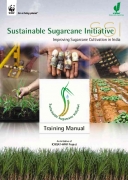/regions/india
India
Irrigation management transfer in India: The processes and constraints - Paper by IRAP
Posted on 10 Jun, 2010 07:12 PMThe paper discusses the evolution of Participatory Irrigation Management (PIM) in India, following the felt need for better irrigation management to prevent water scarcity in many regions in the country.
The irrigation sector was identified as a priority area in the various policy reforms that took place in the water sector in the country.These reforms emphasised the importance of involving end users/farmers in the operation and management of irrigation conveyance systems.
This led to the establishment of the Farmers Managed Irrigation Systems (FAMIS), which aimed at improving the overall efficiency of the irrigation system, generate a sense of ownership among farmers and to improve the irrigation revenue recovery rate. This laid the seeds for Participatory Irrigation Management (PIM) in India.
A complete analysis of water should be done before finalising the water filter
Posted on 10 Jun, 2010 10:23 AMDear Users of IWP,
Activists from the Climate Revolution dig out climate policy gaps through the Right to Information Act
Posted on 10 Jun, 2010 07:27 AM Content Courtesy: AlertNet
Content Courtesy: AlertNet
Activists from the Climate Revolution initiative in India have discovered a crucial tool in their battle to hold the government accountable on its climate policies: the country's landmark Right to Information (RTI) Act.
Read more about Climate Revolution's work on RTI on their website here.
Irrigation water management for food security in India: The forgotten realities - Paper by IRAP
Posted on 09 Jun, 2010 06:14 PMIn this paper, the authors examine the current debates around India's water crisis and its implications for food security in the country. The paper takes a critical look at the recent official assessments of groundwater exploitation in India in the context of these debates.
The paper proposes that there is a need to make a qualitative assessment of the magnitude of food security and water management challenges facing the country. It argues that two important factors drive the agricultural growth and food production in India. These include access and availability of arable land and water resources, which need to be examined and analysed with particular reference to their regional variations, to get a true understanding of the situation.
Sustainable Sugarcane Initiative - Improving Sugarcane Cultivation in India - Training Manual developed by WWF India and ICRISAT
Posted on 09 Jun, 2010 01:25 AM Sustainable Sugarcane Initiative (SSI) is an approach to the cultivation of sugarcane, that can reduce inputs - water, chemical fertilizers, seed material and farm space - while improving sugarcane production significantly. It also reduces crop duration and provides a longer period of the cane crushing season to the sugar industry.
Sustainable Sugarcane Initiative (SSI) is an approach to the cultivation of sugarcane, that can reduce inputs - water, chemical fertilizers, seed material and farm space - while improving sugarcane production significantly. It also reduces crop duration and provides a longer period of the cane crushing season to the sugar industry.
This farm-based approach (as opposed to crop-based) also gives farmers options to grow intercrops, such as pulses to improve their income. Most importantly, SSI reduces the overall pressure on water resources and contributes to recovery of ecosystems. It conserves soil moisture, thereby allowing for growing of dryland crops in the same region.
SSI is inspired from the successful approach of System of Rice Intensification (SRI) paddy cultivation, which like SSI, originated from farmers and civil society to improve agricultural productivity while reducing pressure on natural resources.
Women empowerment - Jalswarajya project launches 'Jalmitra' initiative in Maharashtra
Posted on 08 Jun, 2010 08:54 PMWomen ‘JALMITRA’ spanning awareness on O&M
Article by - Prabhakar Mishra, IEC Specialist, Jalswarajya Nagpur.
Inroduction
Draft of “The Dam Safety Bill, 2010” approved
Posted on 08 Jun, 2010 06:24 PMAs per the Press Information Bureau's press release, the Union Cabinet has approved the proposal of the Ministry of Water Resources for enacting The Dam Safety Bill, on May 13 2010. The Bill is to be introduced in the Parliament.
The main objectives of the legislation are:-
• The new legislation will help the States in adopting uniform dam safety procedures which shall ensure safety of dams and safeguard benefits from such dams.
"We have to accept diversity of knowledge to manage water wisely": Interview with Prof Jayanta Bandyopadhyay on business economics
Posted on 08 Jun, 2010 11:48 AMProf Jayanta Bandyopadhyay, Professor and Head, Centre for Development and Environment Policy, IIM Calcutta, speaks to Bappaditya Chatterjee of Business Economics , on the consequences of global warming and climate change on India's water resources, in the magazine's June 1-15 2010 issue.
Safe drinking water for all using a portable low cost solar disinfection unit - A research paper
Posted on 07 Jun, 2010 02:23 PMThis paper by A Jagadeesh of RMK Engineering College, describes the design and testing of a portable, low-cost, and low maintenance solar disinfection unit, that can provide potable water. This system was tested with bore water, well as well as with waste water. In 5 hours, the unit eradicated 99.99% of the bacteria contained in the water samples.
This unit can provide about 6 liters of pure drinking water and larger units can be fabricated for providing safe drinking water at a community level.
National seminar on water security - Call for papers
Posted on 07 Jun, 2010 01:16 PMOrganizer: Water and Food Equitable Distribution Organisation (WEDO)
Topics:
- Making more surface water available
- Sustainable and enduring solutions for water
Venue: Henry Maudslay Hall, Anna University, Chennai
Description:
WEDO ( Water and Food Equitable Distribution Organisation) is a unique Initiative of professionals and experts with hands-on experience, a Think-tank of the free enterprise with lateral thinking to design and evolve projects on a scientific and technological basis to provide acceptable engineering solutions to be proposed to the nation: Models, designs and plans for Production, storage and distribution of vital resources in India.
